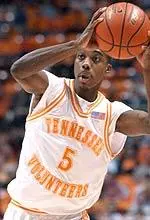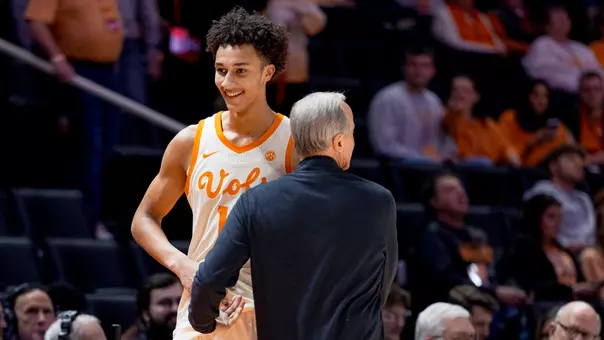University of Tennessee Athletics

Improved Winchester Making More Plays
January 13, 2004 | Men's Basketball
Jan. 13, 2004
The development of John Winchester's shooting stroke was part athleticism, part survival instinct.
Learning the game on the streets in New Jersey, Winchester typically found himself lacking in both age and size. He absorbed enough punishment from sharply aimed elbows and forearms on the perimeter to discourage him from penetrating the lane in search of more.
"I was always the youngest one getting picked," Winchester said. "When you're the little man and you're the youngest, they're going to throw you around. That's why when I was younger all I would do was shoot outside, because I was little. I knew if I took it to the basket, I'd get thrown to the ground. I had to pick and choose my spots."
Winchester had little coaching when he was young, yet he was a disciplined student of the game.
"I was always a young kid on the street watching the older kids and that's how I learned," Winchester said. "Then I always went home and practiced every day after school -- every day -- by myself."
Winchester thrived on that regimen. It helped him become a top-50 national prospect and Parade All-America at Marist High School in Connecticut. And it's one he resumes each summer as a break from the stresses of college life.
"That's the best time, in the summer, because all I worry about is basketball," Winchester said. "I wake up every morning and go to the park and shoot and play. Then I go to a friend's house in New Jersey and workout."
Winchester's basketball education continues at Tennessee. Following a year of learning and adjustment, he's made the leap to the Vols' playing rotation as a sophomore.
"There's more to it at this level," he said. "You've got the academic part, you've got weights and conditioning, and then you have basketball. After all that, your brain is drained, your body is drained and then you've got practice. But it's just something you've got to get used to."
It's hard to still claim the moniker of little man when Pee-Wee Gash is your Tennessee teammate. But at 6-foot-4, 175 pounds, Winchester continues to match up with more physical foes. Yet he now takes as much pride in shutting down an opponent as he does in lighting him up on the offensive end. The preparation required by the college game makes a difference, Winchester said.
"You watch tapes on your opponent," he said. "I'm used to just watching games. But we break it down on tape, looking for weaknesses, just like the other team is doing on us, looking for our weaknesses. That's what's great about college basketball."
Yet ultimately, what he learned on the street makes the difference in college as well.
"It's more structured," Winchester said. "But most of the time, you've just got to go out there and make plays."
Larry Happel
















